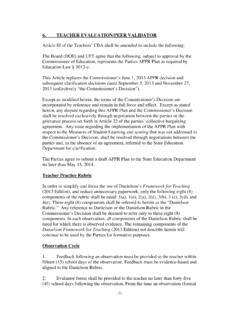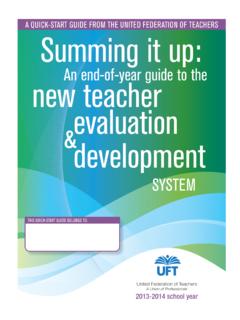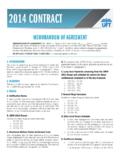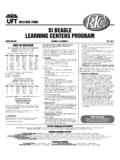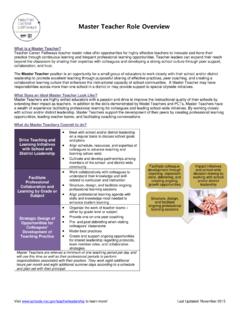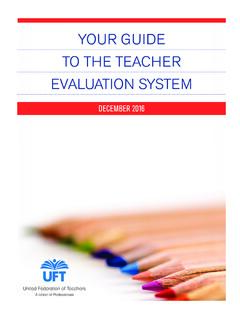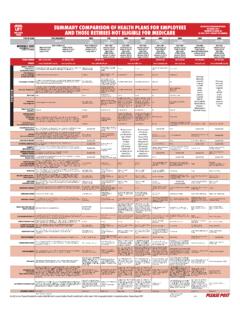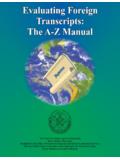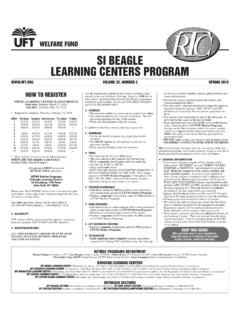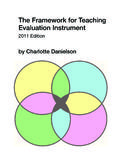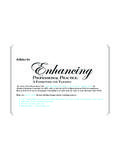Transcription of Advance Guide for Educators - United Federation …
1 Advance Guide for Educators New York City Department of Education 2014 -2015 Updated: September 15, 2014 Letter from Chancellor Carmen Fari a Dear Colleagues, As Educators , we are United by a single goal: ensuring that we prepare our students to graduate from high school ready to succeed in college and careers. Our transition to the Common Core standards raises the bar for our students and underscores the power of high-quality teaching as a tool for helping students reach these higher standards. To support our students in meeting these higher standards, we must support teachers in continuously developing their instructional practice over time. Advance refers to New York City's first system of teacher evaluation and development that considers both what teachers do and how students do. We believe that when our teachers and administrators look at these things together with shared goals for student success, it is possible for schools to progress student learning in new ways.
2 Advance also helps the DOE recognize the most effective instructional strategies and use that knowledge to strengthen teacher practice by systematically providing teachers rich feedback they can use to develop their practice. Last year marked a significant year of growth and change for all of our schools. My first priority as Chancellor was to listen and learn from the talented professionals who were pioneering this work in their schools and classrooms. Throughout the year we hosted a number of town halls, focus groups, and feedback sessions to understand the experiences our Educators were having. Teachers, administrators, and other colleagues shared key feedback to help us improve the policies that drive school-level practices. We are excited to build off the strong foundation that we laid last year. Additionally, our newest contract with the United Federation of Teachers (UFT) marks the first time in City history that the Department of Education and the UFT have designed an agreement that provides for multiple measures of teacher effectiveness.
3 I am proud of the collaboration that led to this contract and the improvements that we agreed to. You will find that this Guide reflects feedback both the DOE and the UFT heard over the course of the 2013-14 school year. This Guide explains the key features of Advance , including what changes you can expect in the 2014 -15 school year, and where you can find support. I encourage you to take the time to review it and refer back to it throughout the year. Since last year, more than 10,000 teachers and school administrators have participated in in-person, centrally-led training, and thousands more have engaged in school-based training and on-line professional development about Advance . It is exciting to recognize our Educators investment in this work. I am confident that with your support and commitment, Advance will help us realize our shared goal of providing a high quality education for our students. Sincerely, Carmen Fari a In this Guide , you will find: Highlighted policy changes for the 2014 -15 school year A detailed explanation of the components of Advance A graphic representation of the scoring components An evaluation timeline so you know what to expect and when Suggested steps you may take during the first few months of the school year A hyperlinked list of resources and supports to Guide you in getting the most out of Advance Advance Guide for Educators Section One: Get to Know Advance Section Two: Implementing Advance in Your School Section Three: Resources and Support Finishing the Year Strong: End-of-year steps to set our students and Educators on a path to continuous improvement.
4 Page 16 Overview of Advance : Advance , our teacher evaluation and development system, represents our shared commitment to ensuring that all students in New York City graduate college and career ready. Page 1 A Closer Look at Measures of Teacher Practice (MOTP): Through MOTP, Educators engage in a collaborative cycle of observation, feedback and reflection. By establishing a shared language about instruction, MOTP provides a framework for school communities to use in supporting teacher development. Page 4 A Closer Look at Measures of Student Learning (MOSL): Measuring student learning allows Educators to better understand their students strengths and how best to support student growth. By collaboratively making thoughtful MOSL selections, schools can measure student growth in meaningful ways that reinforce their instructional priorities. Page 10 Day-to-Day: How does Advance support the day-to-day classroom instruction of teachers?
5 Page 14 Starting the Year Strong: What can Educators do in the first 90 days to get the most out of Advance ? Page 13 Online Resources and In-Person Support: Drawing from the lessons learned and best practices that emerged across the city in the first year of implementation, the DOE has created a suite of resources to support teachers and administrators in implementing Advance . Page 18 1 Introduction to Advance In New York City, we are focused on ensuring that all students graduate college and career ready. A large part of meeting this goal requires us to prepare our students to think for themselves and pursue questions instead of answers. Great teaching is key to achieving these goals and Advance is part of our shared commitment to recognizing and strengthening teaching practice. As we enter the 2014 -15 school year, we reaffirm our shared commitment to ensuring the work of Advance supports teaching and learning in our schools.
6 We also believe that our schools and communities must be grounded in an ethic of shared responsibility and collaboration. Our Educators , teachers and school administrators, must engage in a collaborative cycle of observation, reflection and feedback. In addition, Educators must understand their students strengths and areas for improvement. To do this, the work of Advance must be aligned and integrated with our daily work by supporting our instructional vision, providing us with deeper knowledge of our students, and fostering collaborative professional development. New York State Policy and Context In 2010, New York State passed Education Law 3012-c, introducing significant changes to the Annual Professional Performance Review (APPR) for teachers and principals. This law laid the foundation for a more meaningful evaluation system that: Incorporates multiple measures of a teacher s effectiveness; Uses a 4-point HEDI (Highly Effective, Effective, Developing, Ineffective) rating scale; Provides teachers with more specific feedback; and Supports school administrators to connect evaluation to professional development.
7 The New York City Department of Education (DOE) and the United Federation of Teachers (UFT) are working together within these parameters to develop and improve Advance , by structuring choices for schools about the measures that it includes and conferring often on the overall implementation of the system. "I feel that while challenging in its first year of implementation, Advance is the most significant improvement in teacher evaluation in my career. In addition, Advance creates a seriousness and weight to coaching teachers that was absent in the prior system of S/U. NYC principal NYC Voices Satisfactory Unsatisfactory Ineffective Developing Effective Highly Effective The previous evaluation system 2014 -15 Citywide Instructional Expectations OVERVIEW OF Advance 2 The Importance of Multiple Measures in Advance Teaching is a complex and multi-faceted skill, so measuring teacher effectiveness and providing developmental opportunities to teachers is a complex and multi-faceted process.
8 No single tool or method can fully measure a teacher s impact on students. That s why Advance uses multiple measures both Measures of Teacher Practice (MOTP) and Measures of Student Learning (MOSL) to provide teachers with access to various sources of feedback and more support to develop as Educators . Using multiple measures allows us to get a more complete picture of what s happening in each classroom and ensures fairness and accuracy of teachers ratings. Additional research supporting this approach can be found on the Advance website. Advance provides teachers and administrators with several opportunities to collaborate and reflect: Initial Planning Conference Measures of Teacher Practice o Multiple classroom observations, followed by written and/or verbal feedback Two different Measures of Student Learning o State Measures o Local Measures Summative End-of-Year Conference The new evaluation system is a great tool to help teachers monitor, develop, and/or improve instructional practices that allow for professional growth.
9 NYC teacher NYC Voices Multiple Measures Provide a More Complete Picture of Teacher Practice State Measures of Student Learning Local Measures of Student Learning Measures of Teacher Practice Frequent cycles of observation and feedback Measures of student academic growth Student surveys (non-evaluative in SY 2014 -15) 3 Establishes a common language and increases dialogue about effective instruction Provides opportunities for teachers to be observed and receive formative feedback at various points throughout the year Provides assessment data that can be used to inform a teacher s instruction and professional development Provides information on student progress over the course of an entire year and a contributes to the summative teacher rating MOTP MOSL Multiple Measures Working Together in Advance Measures of Teacher Practice (MOTP) and Measures of Student Learning (MOSL) are mutually reinforcing processes.
10 Research supports our belief that a successful system of teacher evaluation and development is one that combines actionable feedback from evaluators at multiple points throughout the year and a clear understanding of what students learn over the course of the year. These two subcomponents of Advance complement each other to provide a more holistic understanding of what s happening in each classroom. Each one contributes different aspects to Advance , strengthening the system overall and ensuring that everyone is working together to support teachers in the areas that will most impact student learning. 4 Teachers will be evaluated on only eight components in the danielson Framework for Teaching (2013). Evaluators may use all twenty-two components in the danielson Framework for formative purposes. Evaluators will provide teachers with feedback within 15 school days of an observation.
